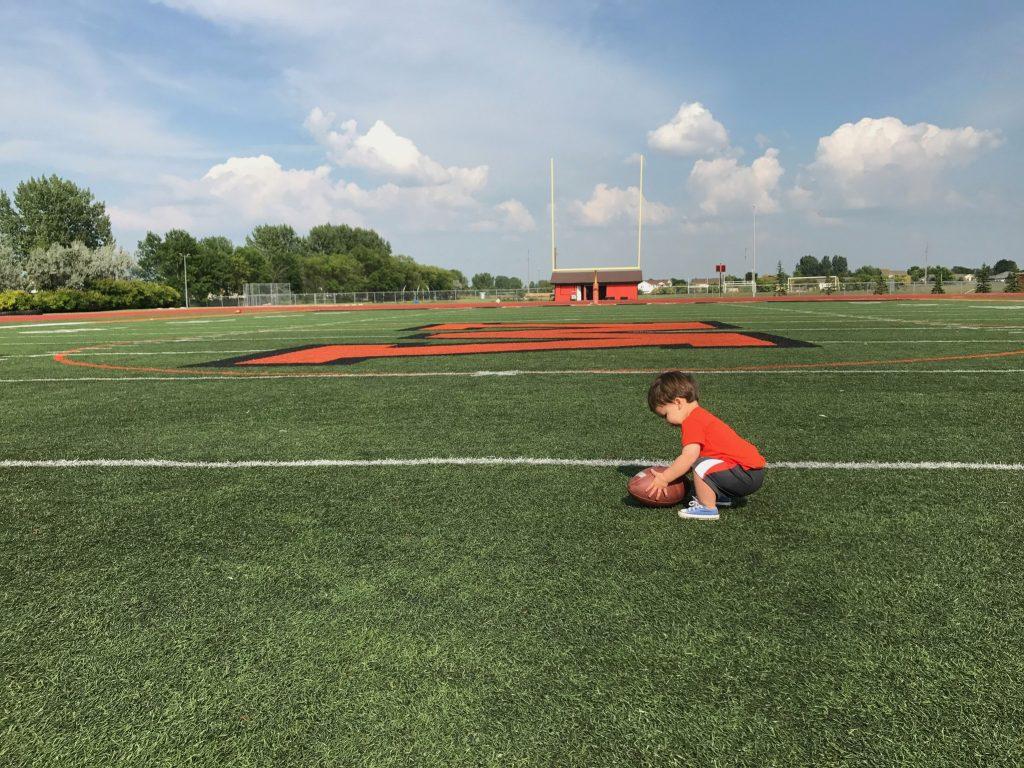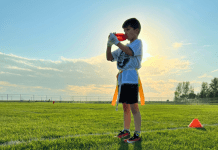
I’ve been reading a lot of books lately regarding play, focus, organized sports, and learning for kids.
And I am at the stage where my oldest is no longer a toddler. As both my kids are growing up, we’ll need to make the decision to let our little kids participate in organized sports now or continue to let them grow with unstructured play for a while longer.
Organized Sports vs. Unstructured Play
One book I’ve been reading this winter is How Children Learn by John Holt. There have been many parts that have prompted a change in my perspective. Especially one chapter that stated:
“The courage of little children (and not them alone) rises and falls, like the tide – only the cycles are in minutes or even seconds. We can see…walking with their mothers or playing in a playground or park…. The mothers where chatting on a bench while the children roamed around. For a while they would explore boldly and freely, ignoring their mothers. Then, after a while, they would use up their store of courage and confidence and run back to their mothers’ sides and cling there for a while as if to recharge their batteries. After a moment or two of this they were ready for more exploring and so they went out, the came back, and then ventured out again….If we continually try to force a child to do what he is afraid to do, he will become more timid, and will use his brains and energy, not to explore the unknown, but to find ways to avoid the pressures we put on him. If, however, we are careful not to push a child beyond the limits of his courage, he is almost sure to get braver.” pg. 170- 171, John Holt, How Children Learn, DaCapo Press, 2017.
I thought, “Woah! Powerful.” I LOVE watching children playing in every stage in life. From the newborn doing tummy time, to the 13-year-old climbing or doing parkour.
The Value of Unstructured Play
And to think that your child is building their courage just by play makes sense.
I thought of some of our trips to the park this summer. How my children would go out and play but come back and say, “Are you watching me mommy?”
We can get annoyed by this question after multiple times (especially if we’re being interrupted in a conversation with another parent or trying to focus on a different child), but reading this book helped me remember that my children are learning. And they want to show me what they are mastering without even knowing it.
Versus Strict Supervision
And sometimes getting overly involved in the learning process can backfire, as demonstrated in the swimming story below:
“I watched a man trying to teach his three small children to swim. He was the perfect example of the kind of parent I have described, who thinks that by superior will and brute force he can make his children learn whatever he wants to teach them….His plan was to hold her in the water in the swimming position, that is, face down or belly down, while she paddled and kicked…She went rigid in his hands, arched her back as if to lift herself out of the water, and struggled to get loose. No use. Her father held her tightly and said in a louder and louder voice ‘Kick your feet! Move your hands!’ the little girls began to scream partly in terror and anger, partly in the hope that if she made enough notice her father would have to stop…Not long after this he repeated the process with a little boy…. he reduced all three of his children to tears and terror. Pg. 177- 178, John Holt, How Children Learn, DaCapo Press, 2017.
I observed a similar situation when we took our children ice skating with their cousins. My daughters had just gotten their first pair of ice skates, and it was there second time on the ice, skating by themselves.
I Let Them Figure It Out
There was a huge difference between my girls versus and their cousins. The cousins were struggling because their parents were trying to talk them through all the steps. They were told to grab the bar, move their feet back and forth, stand straight. They were picked up by their parents then plopped down and then told do it again. I could sense the pressure they felt.
Whereas my girls said, “I can skate by myself,” and grabbed the support bar for themselves. I just stood and watched. The only advice I offered when they were learning was,“Stand tall like a giraffe.” Then I stayed quiet. I didn’t tell them how to move their feet back and forth or show them how to stand up after a fall.
They did look at me for guidance when they would fall, to see of if this was a good thing or bad thing. I didn’t react or say anything and they giggled, pulled themselves up, and continued to skate. And they had so much fun.
It was hard to just stand there and skate next to my girls without saying anything, without trying to help. But I reminded myself to bite my tongue to let them build up their courage.
And if they needed me to do something or asked a question, I answered it.
Organized Sports
Now this skating helped raise the question — are my children ready to start an organized sport? Being in the Midwest, you see that parents putting their kids in hockey or gymnastics as early as three to four years old.
My daughter seems like a natural at skating and gymnastics and I could be considered behind the ball because she is just starting. And I could get her into a team this very moment if I truly wanted to prepare her to be an Olympic athlete. But truthfully, I wouldn’t.
Not that I don’t see she would love it, but because I just want her to play.
Already, I can anticipate the arguments that my kid(s) will be behind on skills, not growing with a team. That they’ll have to work twice as hard to catch up to the kids who have been playing longer.
Although it’s a possibility, I don’t believe that will happen.
I am more concerned that if we do those structured or team sports too early, our kids will be more likely to incur injuries when their bodies aren’t ready for it or they’ll get burned out and lose interest.
As a former competitive cheerleader, I would like my daughters to participate in cheer as well, but realistically, I don’t want them to start earlier than I did.
And one mom shared this with me this thought-provoking question, “Does my kid want to play this team sport or is it ME wanting them to play this team sport?”
Definitely something to keep in mind regarding organized sports.
Unstructured Play
I would rather see my young child playing in the backyard or near the stream, using a fallen log as a natural balance beam. Or pulling themselves up on top of a rock or even the platform on a playground, building their upper body strength.
And I would rather see my daughter’s smiling face as she figures out how to stand up and skate the length of the ice rink, without a coach telling her to move faster.
There are of course some aspects of organized sports that I would enjoy. Particularly watching the group of kids all clump together to go chase the soccer ball or hit the hockey puck. Or watching my daughter bounce on a mini trampoline through an obstacle course in a little leotard.
Mixed Messages
And we get conflicting messages as a mothers about organized sports. For example, the American Academy of Pediatrics has suggested that children over six years old could benefit from starting in team sports, whereas HealthyChildren.org says that 10-12 years old are more ready for sports. And the American Medical Society for Sports Medicine says girls should wait to focus on a single sport until age 12, and boys should wait until they’re 14.
If we look at the age of when some children start school, for many that’s also the age they start organized sports.
And that’s a big life change to add the pressure of learning a new sport (or sports) at the same time. Although the skills they can gain like teamwork, dedication, and persistence from sports will be beneficial, we don’t want them to feel too much pressure at a young age.
The Financial Aspect
Then another factor I consider is financially, am I ready to commit to the cost of the sports. The 2019 article from Money.com Think Your Kid’s Soccer League Is Too Expensive? Here’s Which Youth Sports Cost the Most (And least) surprised me.
I knew sports were expensive but seeing the graphs was jaw-dropping. And unfortunately the financial aspect could hold some families back from participating.
I want to provide my children with every benefit in the world, and thankfully there are scholarship programs available even in our local park districts. Here are some resources that I found:
Local Scholarship Programs
- West Fargo Park District Scholarship Program
- Fargo Park District Scholarship Program
- Moorhead Park District Scholarship Program
- Every Kid Sports
- All Kids Play (Individual and Organizational Grant Opportunity)
- In Sports Foundation
Overall, I believe sports can help kids develop great life skills.
And I still haven’t decided whether to put my children in sports now or later. But in the meantime, I know they are learning and growing through unstructured play.
















